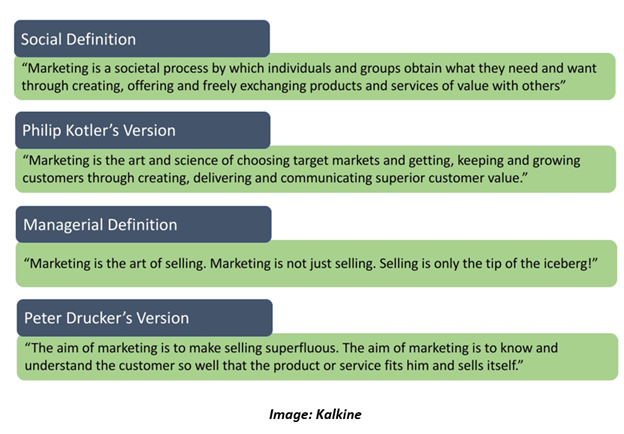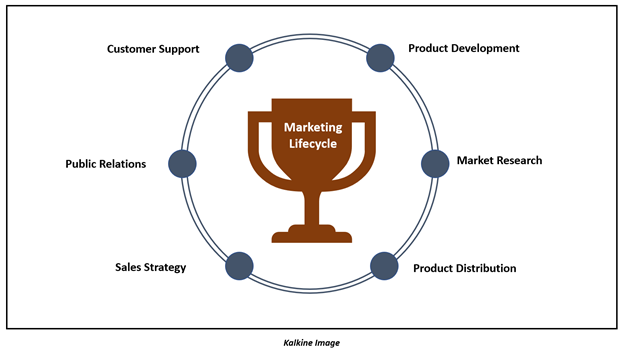Marketing
Updated on 2023-08-29T11:59:29.837265Z
What is Marketing?
Marketing is defined as every action from product research to after-sales service and everything that goes on between these two. It is an important aspect in the lifecycle of commodity/service production and sale.
Many people think marketing is only about selling and promoting the goods and services. However, marketing is a broader concept. It includes various classifications, types and techniques.
Research, advertising, customer relationships and promotion, all come under the umbrella of marketing. Marketers create a perception about the brand, which satisfies customer's needs and wants. All in all, marketing includes brand awareness and building strong customer relationship, resulting in brand loyalty.
ALSO READ: Fundamentals of the Retail sector and the importance of marketing
It is a process that turns the target market (the customer you envisioned using your product when designing it) into actual bona fide buyers of your product.

What are the 4 P’s of Marketing?
4P's of marketing or Marketing Mix are fundamental pillars and objectives that summarizes the entire traditional marketing process. These include:
- Product- To create the perfect saleable product, marketers analyze the market space, customers’ expectations, existing demand and potential uptick in demand of the product, and competitor’s product offerings. Basically, every aspect related to the product is evaluated before the launch.
- Price - Marketers undertake analysis on a fair and competitive price to be considered for the benefit derived. They must look at wholistic factors to determine the intrinsic price, such as input costs, distribution and promotional expenses, discounts, consumers’ willingness to pay and competitors’ prices.
- Placement - For a product to be readily available and in the required quantity, marketers, decide on its placement in the market space. This involves decision wrt supply of products/services or stores and shops or via online channels.
- Promotion - Marketers create product or brand awareness and make it desirable for the consumers. This includes periodactions on advertising and public relations front.
Marketing is the balance and coordination of these four main areas. There are a lot of other aspects related to these areas, which are all centered around the target consumer. If the marketers get all four of these "P" s in the right balance, they are deemed to enjoy loyal and life-long customers.
Notably, marketing today has widened its goals and is not just limited to the 4Ps. Marketers want to build customer relationships and weed out competitors. Creating value requires gaining new customers, caring for existing ones and growing customer base, while keeping it all strategic.
What is the Purpose of Marketing?
The era of modern marketing started somewhere in the 1950s. Over a period of time, businesses began to use different mediums than the print media to endorse their products and services. Soon after the spread of television, the internet reached every household. Marketers found this as an excellent opportunity to attract and influence consumers via different online portals.
Apart from advertising, promotional activities were being undertaken via public relations, events and collaboration. All helped them to convert consumers into leads and leads into the customers.

From inception to the ending, a product's complete life cycle is correlated to marketing. From identifying the audience to communicating with them, increasing the market share and ultimately building brand loyalty; marketers work with an aim to put forward a product or service successfully in the hands of consumers.
ALSO READ: Don’t Miss! 4 ASX Marketing & Communication Stocks Amid COVID-19
What are the Basic Types of Marketing?
There are a hundred different ways businesses can market the product or services. One successful marketing strategy may not particularly suit the other company. Hence an ideal marketer would come up with a customised marketing plan for its brand and not just depend on what is trending in the market.
Marketing is mostly related to humane tendencies, and as we grow and everything around us grows, marketing evolves as well. For any business, the consumer is the king. As marketing revolves around the needs of the consumer, it has to change and adapt as well, to be relevant and impactful. Below are some forms of marketing that can be utilized by managers:
- Traditional marketing: In this type of marketing, brand promotion is undertaken via methods such as print, television and billboards. This strategy is referred to as 'traditional' because it is a marketing process which was widely and solely used before the internet was invented.
- Outbound and Inbound marketing: In outbound marketing, the messaging is pushed to the consumers through methods such as print ads, TV ads, cold calling, and email blasts. Whether the consumer requires the product or not, the message is delivered to create the need and awareness. Inbound marketing focuses on creating a valuable experience to the consumers, rather than directly pushing the messaging to them. In this concept, the queries and messages of customers are looked at.
- Digital and social media marketing: Many strategies fall under the digital and social media marketing campaign. Technology is leveraged in the best possible way to receive the same or more results, like traditional marketing offers. Search engine optimization, pay-per-click, content management and influencer marketing are key techniques widely used by businesses embracing digital marketing.
Have you ever wondered why a product you searched online follows you everywhere on the internet? It is because of retargeting strategies. Because of being less expensive than traditional marketing, many small businesses have benefited from digital and social media marketing.
- Cause/ social marketing: Most of the governments have asked the businesses to prioritise Corporate social responsibility (CSR) to give it back to the society from their profit share. Many big companies have an entire team to execute CSR activities, as they build alliances with Non-Profit Organizations or launch their own NGO wing or undertake independent actions to provide help to the needy and environment. This is a noble effort, but it also creates a goodwill impression on people's minds and taps an emotional aspect of the consumers.
- Public Relations: Another important aspect of marketing is creating awareness through unpaid mediums. Through public relations, organizations indirectly influence the consumers and maintain a desired representation of the company in the minds of the public.
ALSO READ DETAILS ABOUT RELATED MARKETING CONCEPT: Multi-Level Marketing
Famous brands which are embedded in our minds, even if we use them or not, is all because of the successful marketing. With thousands of brands bombarding the market space to seek consumers attention, only a few of them are able to achieve what they set out to. Crafting a 360-degree marketing campaign is the key to success.